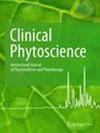Costus speciosus leaf and seed extracts for wound healing: a comparative evaluation using mice excision wound models
引用次数: 0
Abstract
The present study investigated the potential wound healing activity comparisons between ethanol leaf & seed extracts of Costus speciosus topical formulation using mice Excision wound models, compared to Neomycin sulphate ointment as a standard drug. To assess the efficacy of Costus speciosus ointment as a potential alternative to commercially available ointments, a study was conducted using a cohort of 16 healthy male mice, aged between 3 and 4 months. The ointment formulation was prepared utilizing ethanol extracts from both the leaves and seeds, presented in a dosage form for application. This investigation seeks to provide insights into the comparative effectiveness of Costus speciosus ointments in relation to conventional market preparations, with a focus on its potential applicability as an alternative therapeutic option. The parameter measured was wound contraction and epithelization period. The mice groups treated with seed & leave extracts ointment showed better wound size changes than the negative and standard groups. However, the leaf extract ointment promotes the formation of granulation in tissue, allowing the reepithelization phase to occur more rapidly than seed extract. From the 1st day to the results of the 9th day of the extract indicate that there is a significant increase (P < 0.05) in the percentage of wound contraction in the group. After 21 days the wound was healed fully. These results suggest that ointment of ethanol leaf extract of Costus speciosus could be an answer to facilitate wound healing compared to seed extract, to approve the traditional claims of the plant in wound healing activity. The study concludes that ethanol leaf and seed extracts of Costus speciosus exhibit potential wound healing activity in mice excision wound models. The topical formulation of these extracts significantly enhances wound closure, reduces wound size, and increases tensile strength compared to the control group. The efficacy of the extracts is comparable to the standard drug, Neomycin sulphate ointment. Therefore, the use of Costus speciosus extracts in topical formulations can be considered a promising alternative for the treatment of wounds. However, further studies are needed to determine the safety and efficacy of these extracts in humans.用于伤口愈合的木贼叶和种子提取物:使用小鼠切除伤口模型进行比较评估
本研究使用小鼠切除术伤口模型,与作为标准药物的硫酸新霉素软膏相比,研究了木犀草局部配方的乙醇叶片和种子提取物的潜在伤口愈合活性。为了评估木犀草软膏作为市售软膏潜在替代品的功效,研究人员使用了 16 只 3 至 4 个月大的健康雄性小鼠。软膏配方是利用叶片和种子的乙醇提取物配制而成的,并以一种剂型提供给小鼠使用。这项调查旨在深入了解木香软膏与市场上传统制剂的比较效果,重点是木香软膏作为替代疗法的潜在适用性。测量的参数是伤口收缩和上皮化时间。与阴性组和标准组相比,使用种子和叶提取物软膏的小鼠组显示出更好的伤口大小变化。不过,树叶提取物软膏能促进组织肉芽的形成,使再上皮阶段比种子提取物更快发生。从使用提取物的第 1 天到第 9 天的结果表明,该组伤口收缩的百分比显著增加(P < 0.05)。21 天后,伤口完全愈合。这些结果表明,与种子提取物相比,木贼的乙醇叶提取物软膏可以促进伤口愈合,从而证实了该植物在伤口愈合活性方面的传统说法。研究得出结论:在小鼠切除伤口模型中,木贼的乙醇叶提取物和种子提取物具有潜在的伤口愈合活性。与对照组相比,这些提取物的外用配方能明显促进伤口闭合,缩小伤口面积,增加拉伸强度。这些提取物的疗效与标准药物硫酸新霉素软膏相当。因此,在外用制剂中使用木贼提取物可被视为治疗伤口的一种很有前景的替代方法。不过,要确定这些提取物对人体的安全性和有效性,还需要进一步的研究。
本文章由计算机程序翻译,如有差异,请以英文原文为准。
求助全文
约1分钟内获得全文
求助全文
来源期刊
自引率
0.00%
发文量
18
审稿时长
13 weeks
期刊介绍:
Clinical Phytoscience is an international, peer-reviewed, interdisciplinary, and open access journal publishing high quality research articles on clinical evidence and use of medicinal plants in the development of efficient and well tolerated phytotherapy. Clinical Phytoscience focuses on phytotherapy, looking at proof of concept, efficacy and safety, to be established “at eye level” compared to pharmacotherapy. The emphasis lies on application oriented topics (efficacy and safety of phytotherapy in a specific indication, including its need and acceptance by the patient). The scientific results published in the journal should contribute to the recovery and maintenance of human health by phytotherapy. Clinical Phytoscience will publish high-quality evidence-based clinical studies and relevant pharmacological studies. Key areas of interest are: -Upper and lower airways, ENT and pneumology -Gynecology -Urology -Nephrology Pediatrics -Intestinal tract -Hepatology -Diabetes/metabolic Syndrome -Immunology and microbiology -Hygiene -Analytics

 求助内容:
求助内容: 应助结果提醒方式:
应助结果提醒方式:


